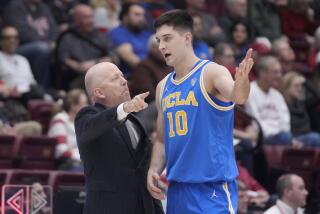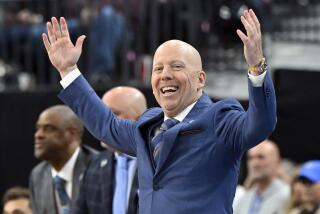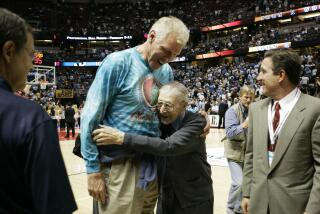John Wooden’s first All-American at UCLA stood out in other arenas
John Wooden’s first All-American at UCLA never played a minute in the NBA. He was neither a prized recruit nor a prolific scorer, and as a shooter, he wasn’t much.
George Stanich, however, ranked among the most versatile athletes to ever play for Wooden.
An Olympic bronze medalist in the high jump before he met Wooden, Stanich later was a minor league pitcher. In between, he was a two-time All-Pacific Coast Conference guard who helped UCLA reach the NCAA tournament for the first time and Wooden to win the first two of his 19 conference championships.
“It was,” Stanich says of his days on campus at the midpoint of the 20th century, “a beautiful time in my life.”
Later, during his tenure as basketball coach at El Camino College, Stanich again played a key role in helping shape UCLA’s run of NCAA titles, recommending to Wooden an unheralded but wondrous athlete not unlike himself: Keith Erickson.
“Of all the men that I’ve met,” Erickson says, “George Stanich is as close to John Wooden as I’ve ever known.”
The list of All-Americans produced by Wooden, of course, includes familiar names such as Willie Naulls, Walt Hazzard, Gail Goodrich, Lew Alcindor, Mike Warren, Lucius Allen, Sidney Wicks, Bill Walton, Henry Bibby, Keith Wilkes and Dave Meyers.
The silver-haired Stanich, 81, predated them all.
He even predated Wooden at UCLA, arriving in Westwood from Sacramento City College in 1947, a year before Wooden was hired away from Indiana State.
Under Wilbur Johns in the 1947-48 season, with the 6-foot-3 Stanich starting at center and his 5-7 older brother John leading the Bruins in scoring, UCLA played a deliberate, methodical style while struggling to a 12-13 record.
A short time later, Wooden put the Bruins through a week of spring drills, permissible at the time, and was aghast.
“I felt that my Indiana State team could have named the score against them,” he wrote in “They Call Me Coach,” his 1972 autobiography. “I was shattered. Had I known how to abort the agreement in an honorable manner, I would have done so and gone to Minnesota or … back to Indiana State.”
Quoted in 1973’s “The Wizard of Westwood,” written by former Times reporters Dwight Chapin and Jeff Prugh, Wooden was even more direct, calling the Bruins a “pitiful … motley crew like I had in physical education classes back at Indiana State.”
Stanich, reminded of Wooden’s initial impression, smiles during an interview in the cramped kitchen of his Gardena home.
“Well,” he says of the late coach, “he hadn’t seen me yet.”
He’s only teasing, he notes, but his words ring true.
In the spring of 1948, Stanich was busy pitching for the Bruins baseball team — among the right-hander’s victories, he says, was a 2-0 shutout against USC, the College World Series champion — and high jumping for the track team.
He didn’t meet Wooden until the following school year, by which time he’d won a bronze medal at the London Games.
Initially, he was wary.
“When Coach got there, he moved me to guard,” Stanich says, “and I hated this because when you’re a center, you always pick up some garbage, and who doesn’t like to score?
“At guard,” he adds, laughing, “you’ve got to work too hard.”
Work was a recurring theme.
“One of the biggest things he believed in was conditioning, and that’s hard work,” Stanich says. “Deep down in my gut and in my heart, I was so happy he worked us that hard, but outwardly everybody resisted that. He was tough.”
Wooden’s demanding ways paid dividends for a team that was picked to finish last in the PCC Southern Division.
A running, hustling group that rarely seemed to tire, UCLA surprisingly won the division title that season, Wooden later calling it “my most satisfying year of coaching.”
A season later, the Bruins repeated and, for the first time in school history, qualified for the NCAA tournament.
Stanich, who averaged fewer than 10 points a game during his three seasons while making about 25% of his shots, left his mark as a rebounder and defender.
Says Hall of Famer Bill Sharman, an All-American and two-time all-conference pick at USC in the same seasons Stanich was honored: “He was probably the toughest player I had to play against. He was faster and quicker and stronger than me.”
In 1950, Stanich was drafted by the Rochester Royals of the fledgling NBA, winners of the league championship a year later, but signed a minor league baseball contract instead.
“Baseball was where the money was,” he says, “but things didn’t work out. I got my head knocked off. They got to me, and they got to me good. The harder I tried, the worse it got.”
By 1954, after two seasons in the minors and two years in the Navy, Stanich had quit playing and gone into coaching.
A father of three UCLA graduates — son John was a middle-distance runner on the Bruins team that won the 1987 NCAA track championship — Stanich lives within walking distance of El Camino, where he coached and taught for 37 years.
He and wife Valerie have been married almost 58 years.
In retrospect, he wishes he’d given the NBA a chance.
His shooting may have been suspect, he notes, “but I had the ability to jump and I had the ability to scrap.”
More to Read
Go beyond the scoreboard
Get the latest on L.A.'s teams in the daily Sports Report newsletter.
You may occasionally receive promotional content from the Los Angeles Times.






